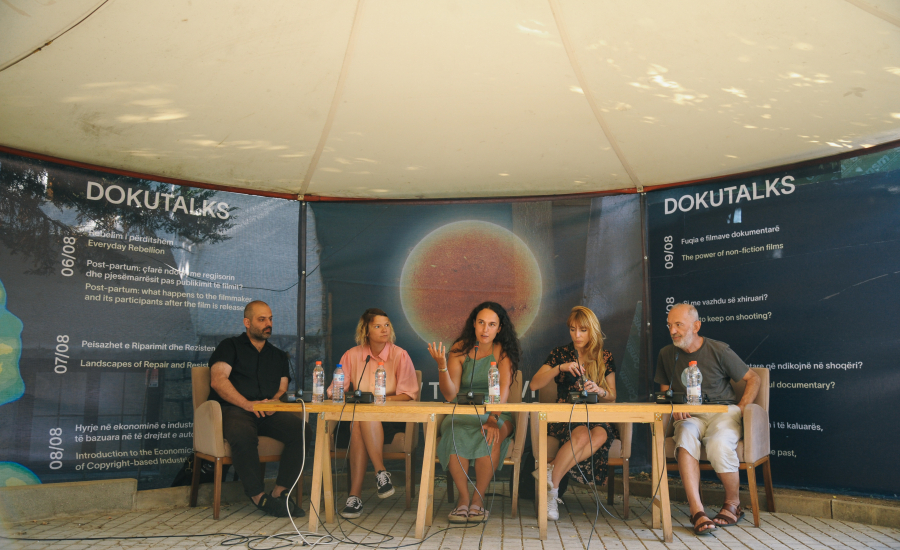10/08/2022
At the end of the day, the compass of a festival dedicated to documentary film is directed precisely at them. In the diversity of topics that "DokuTalk" has addressed and will continue to address, the topic of the influence of these cinematographic products on the audience could never be missing.
The panel composed of Maria Silvia Esteeve, Martin DiCicco, Jelena Maksimovic and Veton Nurkollari moderated by Dea Gjinovci shared their individual experiences during the filmmaking process.
During his speech, the director Martin DiCicco focused on the construction of the relationship with the characters, taking his case as a reference.
"I actually built a relationship with the characters of my film just by bringing them cigarettes from America. I guess I was something new to them, an American with a weird accent. The first day they asked me for fruit because they didn't have any and I brought about 10 kg. Actually I didn't plan to shoot but just stay with them and I think that's where the relationship started. I didn't have any specific idea what the movie was going to be about. They were just happy that I was there and that I could document the dynamics of their lives. From the time I started until the last moment I filmed for 6 years and the first two years I was not very close to them. Until they had problems with payments, they were not being paid by the company, so they stayed in my apartment until they were paid. 15 people stayed in my apartment for 15 days. I think that's where I formed a stronger bond with them and then filming was easier."
As for Jelena Maksimovic, who is behind the filmmaking process as an editor, the relationship with the characters is more different than for those who are on the set.
"It depends on the film, I work in many films, some of them are experimental, others belong to the fiction genre, but I definitely have to be very careful and open with those characters. I like cinema, so it's important for me to make good movies. There are funny situations where you recognize a person from a movie whose face you have edited for months and when you meet him face to face you feel a sense of surprise. This happened to us especially during the period of Covid19 when our meetings were held on the "Zoom" platform."
In her speech, Maria Silvia Esteeve shared her personal filmmaking experience in which it was about characters with whom she herself had family ties.
"I started making films 6 months after my mother passed away. I had previously attempted to build a film and watch the footage until the day my mother passed away. After I cooled down a bit and recovered, I realized that the story of my mother's death was not only my story, it was also the story of my sister and my father. That's why I had to convince them to talk and take them to places that were very painful for us."
As Veton Nurkollari took care to bring to attention during the discussion his experience of selecting films at the festival and the challenge of this process.
"Sometimes I think that those films that are not selected can definitely make another equally good festival. So it is not easy to choose when you are dealing with films with a very good reputation, but sometimes the theme of the films should coincide with the theme of that year's festival. This year, the theme had to coincide especially with this year's theme. We're addressing this important question at a very bad time in which things are not good, and we just wanted to get straight to the point and show that things really are not good."
This afternoon's discussion generated a lot of debate between the panel members and those present in the space where "DokuTalk" was held.
By Ana Haxhimali
Photo Credits: Kushtrim Haxha



